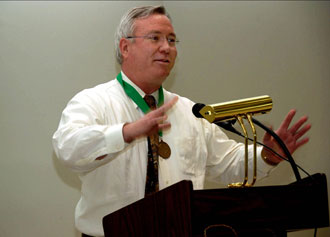Medical Education Innovator in the Limelight
The Tulane School of Medicine has honored a professor who was instrumental in redeveloping the medical curriculum to serve Tulane medical students following the evacuation of New Orleans because of Hurricane Katrina. The medical school used facilities provided by the Baylor College of Medicine in Houston for the academic year of the hurricane.

Craig Clarkson, professor of pharmacology in the School of Medicine, receives the annual Teaching Scholar Award in a ceremony on April 11. (Photo by Sally Asher)
The successful implementation of innovative and scholarly teaching approaches in the demanding field of medical pharmacology earned the School of Medicine's 2008 Teaching Scholar Award for Craig W. Clarkson, a professor of pharmacology.
Clarkson, who directs the Medical Pharmacology course and is also director of graduate studies in medical pharmacology, was presented the award at a ceremony in the atrium of the J. Bennett Johnston Building on April 11.
At the ceremony, Dr. Benjamin P. Sachs, senior vice president and dean of the School of Medicine, presented Clarkson with a plaque and a medal signifying his induction into the Health Sciences Center Society of Teaching Scholars.
“Society membership reflects public endorsement of the member's meritorious teaching and learning and ongoing involvement in educational scholarship,” says Sachs. “Being a teacher of excellence is not something I take lightly. This is the one of most important functions that we have educating the next generation of physicians and scientists.”
“The Teaching Scholar Award is particularly important for the School of Medicine,” says Dr. N. Kevin Krane, professor of medicine and vice dean for academic affairs at the medical school. “It is the highest award that is given for recognition for teaching. But it is more than a teaching award it also is an award that recognizes educational scholarship as well.”
Clarkson joined the Tulane medical school faculty in 1985, and has labored since then to improve education for students. He has served on numerous faculty, thesis and degree committees, and over the past 10 years he has logged more than 700 teaching hours. Clarkson has played a central role in recent major revisions to the medical curriculum.
“One of the important recent tasks of the medical school has been to integrate the first- and second-year curricula, and Craig Clarkson has helped with that,” says Annie Daniel, assistant professor of clinical medicine and director of the Office of Medical Education. “In addition, as an ongoing process, Clarkson has introduced innovative teaching methods, many of these making use of web-based technology, including audience-response systems such as online self-assessments for students, and online lecture media (podcasts).”
A key focus of Clarkson's innovations has been to move away from the traditional academic formula of teaching by formal didactic lectures and rote memorization, according to Daniel.
“Clarkson is trying to make classes more interactive, more engaging for students, rather than just passively giving them information, having them memorize it and give it back,” she says.
